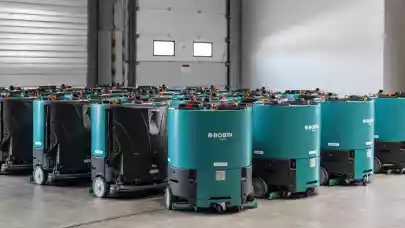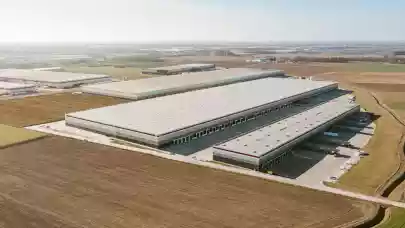
Classical shopping centres should adapt to the latest trends in retail to survive. That includes establishing strong ties between the digital and physical world and defining the tenant mix more accurately. Entertainment is also a must as these centres will have to become beloved community centres as well, says Márk Balástyai, Project Director of the recently opened Etele Plaza, built by Hungarian developer Futureal.
According to one of our recent interviews, "space as an office is dead, long live space as a service". Is it right to say that classical shopping centres are dead, long live shoppertainment and community centres?
Based on our experience the companies are not primarily looking to downsize office space, but to transform it and add new community functions. Location and accessibility are still the most important factors, combined with a high level of tenant expectation about the quality of office buildings because that's the only way they can attract their employees back to the office.
The workplace becomes a communal and creative workshop, where colleagues need to be able to work effectively in a pleasant, inspiring, healthy and safe environment. The BREEAM sustainability standard, the human-centred WELL certification or Futureal’s Stay Safe healthy workplace initiative respond to these needs. The largest companies are also adapting to ESG guidelines, and their office locations are aligned to this. Therefore, when it comes to selecting the ideal office, they consider relevant features of a building including its carbon footprint or use of renewable energy sources, as well as the developer itself.
It is also crucial that an office building is surrounded by commercial services as it makes employees' lives easier. That’s why our large-scale office projects have direct access to shopping centres. In Corvin Promenade we developed Corvin Plaza, in the South Buda City Centre project we opened Etele Plaza in the vicinity of our flagship office complex Budapest ONE.
As for the shopping centres, entertainment and leisure, combined with the digital experience are becoming of the utmost importance. It is happening already that the most successful shopping centres are serving as shopping and entertainment centres for the communities and establishing strong relationships and experiences between the digital and the physical world.
According to a well-known saying "retail is detail". Do you see major improvements in this field? How architects, developers, property managers and construction specialists can make us (customers) forget that we go into a big box when we enter a shopping centre?
A fifth-generation plaza provides visitors with an unprecedented visual experience, digital and architectural solutions, outstanding services as well as a green and sustainable environment. For example, the exterior design of Etele Plaza is dominated by the largest curtainwall structure in Hungary above the main entrance. Meanwhile, the soft tracing creates a unique environment in the internal area. The interiors including the fashionable corridors, an elegant lobby, attractive decor, and the country’s most spacious food court directly connected to the green-roofed terraces also bring the latest generation of shopping centre design to Hungary.
For the food court, the various seating systems and furniture were selected after close consideration of expected guests' ages and their various dining preferences. Families have a dining area designed just for them, where tables and chairs sized for children are placed next to a playing mat, a TV set, and interactive toys.
In addition to the shops, there is a wide range of food outlets, restaurants, cafés, fitness facilities, a children's play area, and services. Moreover, the Etele Cinema takes the movie experience to a new level in the shopping and entertainment centre.
Retail projects must take a sustainable and human-centred approach if they want to stay competitive. Nearly 4,000 sqm of green space, ornamental grasses, shrubs, and trees await visitors at Futureal’s new, environment-friendly shopping and entertainment centre with a rentable area of 55,000 sqm. In line with the BREEAM certification, special attention was paid to ensuring easy accessibility, minimizing light pollution as well as direct environmental impact, incorporating durable materials, and promoting waste reduction and reuse.
State-of-the-art equipment is also available to ensure the safety and health of visitors. In line with Futureal’s Stay Safe initiative, the interior areas are almost completely touch-free. The HVAC systems of the building will include UV sterilizing filters. By using an environmentally friendly technology based on biological filtering, the systems provide almost 100% efficiency in killing viruses and bacteria in seconds, without the use of chemical disinfectants, providing fresh and clean air inside. The escalators are also fitted with a built-in handrail sanitizer system. The surface of all the furniture is made of a special antibacterial, virus-eliminating material and the sinks can be used without touching them.
Do you agree that e-commerce will kill more traditional (offline) retailers if they miss putting substantially more money into their own online sales activity?
Due to the pandemic, digitalization, therefore the growth of the e-commerce sector has accelerated over the last 2 years, but it does not pose a threat to offline retail as the market pie is growing as well. Offline shopping is still relevant, and investors believe in this sector. Etele Plaza is a fine example as the occupancy rate reached over 90 percent by the opening of the shopping centre despite of COVID-19 situation. We are confident that offline and online shopping will strengthen each other but the market players have to focus on customer experience, and they need to align their services to the shifting demands to keep and increase their competitiveness.
It seems that the space of online retailers is growing rapidly in many of the Hungarian shopping centres. Do you expect this to continue in the next 1-2 years across the whole retail sector?
Successful online retailers are increasingly realizing that in addition to a virtual presence, it is also crucial to open a physical store for their products and services closer to customers. As an example, one of the largest online retailers in Hungary, Emag opened its largest store in Etele Plaza, which operates as a point of sale, a showroom, and a customer service centre.
In the Hungarian e-commerce sector, the most popular items are electronics and food products. For electronics products, retailers have those products. The majority of food retailers already operate in a hybrid format (i.e. online and physical shops at the same time). Online fashion retail is also growing in Hungary and there is increasing competition for customers in the online space.
Retailers who support their sales activities with a physical presence will have competitive physical stores that add valuable features to online retail activities, such as physically touching or trying on clothes, but returning goods or dealing with warranty issues can also be handled more efficiently. An international example is the highly successful store openings of Amazon, the largest online retailer. Therefore, the trend will continue, and an increasing number of online retailers will open physical stores in the future.
Managers should be in trouble while defining the perfect ratio of each tenant category within a shopping centre. What are the major changes in this respect? Which retailers are the winners and the losers? We think Food & Beverages are in the first group, is that correct?
Indeed, in recent years we have experienced that Food & Beverages tenants, that used to occupy 10-15% of the total leasable floor area of a shopping centre, now occupy up to 20-25% of this area. However, the pandemic has stopped the growth in the F&B sector, and besides the pandemic, this sector is now also facing labour shortages, and rising raw material and energy costs.
Meanwhile, there have been clear winners of the pandemic as drugstores, DIY and home décor stores are showing strong growth. The fashion retailers that form the backbone of shopping centres are not in an easy position, but with the lifting of Covid-19 restrictions, strong demand is starting to return and almost all international fashion retailers are linking their physical stores to their online presence. Therefore, stores are now pick-up and even drop-off points, and you can even order online in-store.
We find a lot of smart office buildings in Budapest. To be smart is a must for the retail centres too. What are the advantages of being smart in the case of a shopping centre?
Etele Plaza is Hungary's first smart plaza that is able to provide a personalized shopping experience from the moment the customers leave their homes, through its proprietary mobile app and cloud-based services. The next-generation shopping and entertainment centre not only helps visitors navigate and find the ideal parking space but also leads them to the selected shops while offering tailor-made deals for each customer.
There are 1,300 places in the car parks accessible from all directions, and almost 130 slots include stations ready to charge electric cars, the price of which will be easily paid for via the app, added to the parking fee. At both entrances to the plaza, the longest continuous interactive LED wall in the capital has been installed, there are several benches with USB ports and a large digital play mat is also available.
At the information desk, a Hungarian-speaking Pepper robot will guide customers on their way. The plaza also introduced Ariadne to the public, a ground-breaking Hungarian invention to help the blind and visually impaired, developed by the engineers at Óbuda University. The grand opening was the world premiere of the special mobility tool- since this is the first time it has been utilized in a commercial environment after being successfully tested by the Hungarian Federation of the Blind and Partially Sighted.
How do you use Big Data to increase profitability and the level of service in Etele Plaza?
As a smart plaza, we have a complete, holistic data strategy. The data we collect and continuously analyse goes beyond solutions that are only supporting marketing objectives and customer experience. Our database provides full support in many areas that are not visible to the customer but also plays a crucial part in maintenance and sustainability such as energy-efficient building operation.



